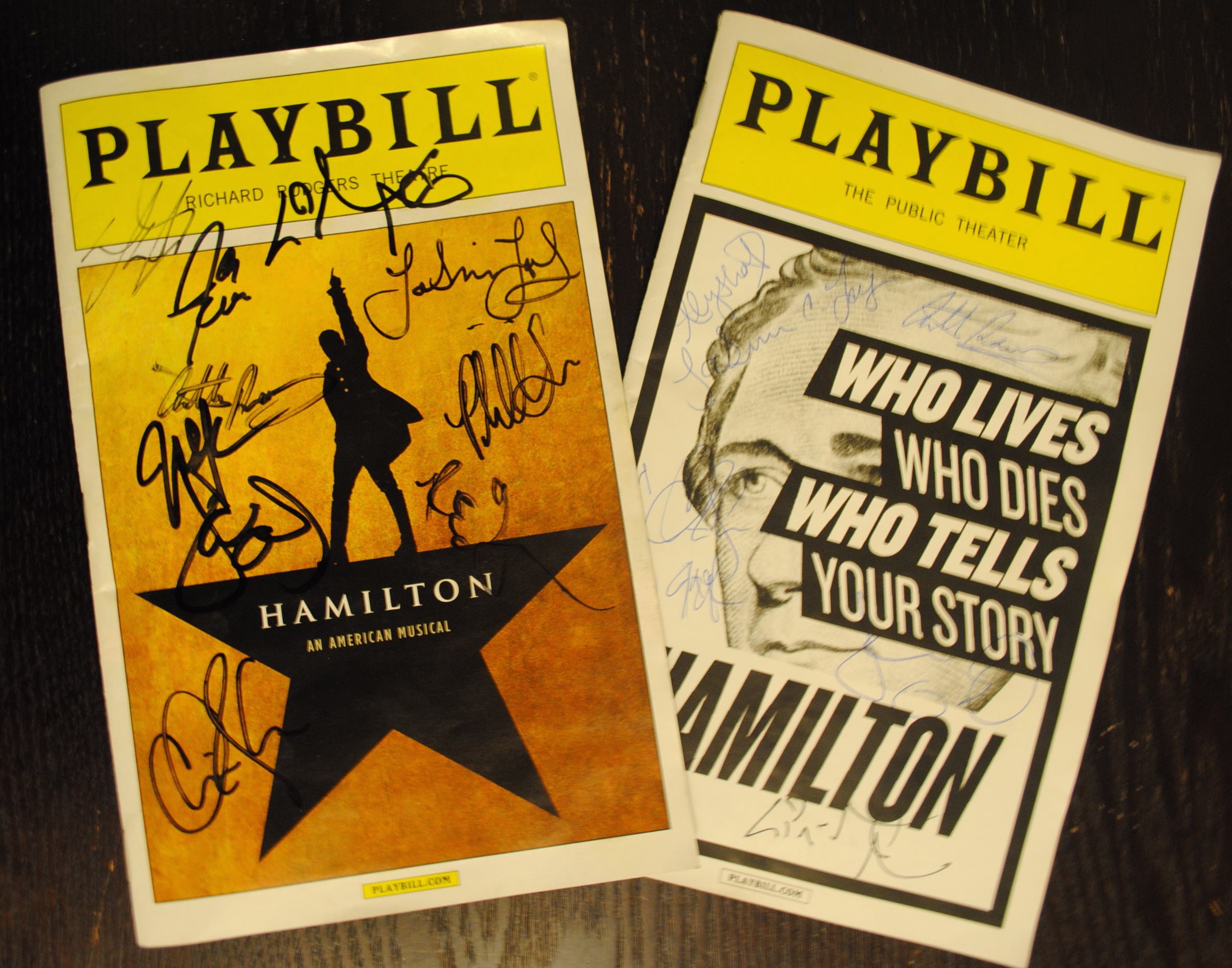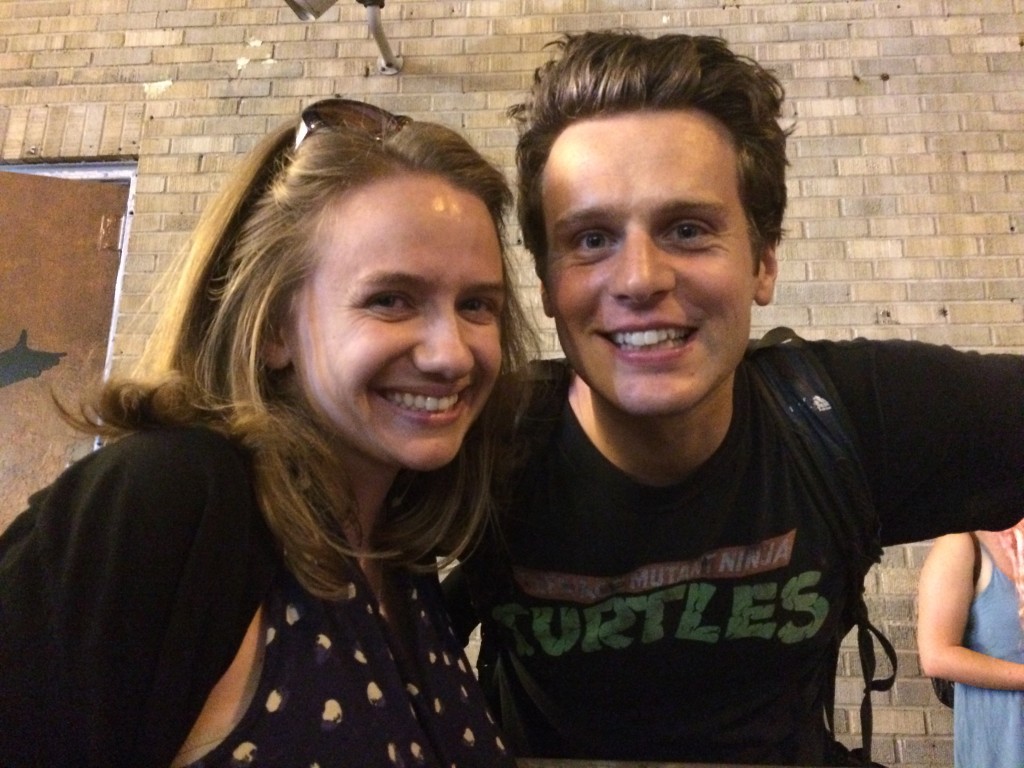M: Speaking of the double roles, let’s talk about the awful gut punch you get when you listen to the first song again and realize the double meaning behind what the characters are saying about their relationship to Hamilton. Diggs and Onaodowan say “Me? I fought with him” — Lafayette and Mulligan fought alongside Hamilton in the Revolution whereas Jefferson and Madison fought with him in Congress. The real killer is Ramos saying “Me? I died for him.” Laurens died for the cause he and Hamilton loved in one of the last battles of the war (this is the one song left out of the cast album), but more heartbreaking is the idea that his son Philip died in a duel protecting the honor of his father…and because Hamilton told him not to shoot his opponent so as to keep his conscience clear. Absolutely DEVASTATING.
X: Great points on all the double meanings in the first song! The material really is incredibly dense. So much to discover on each viewing/listen.
S: YES. Again speaking of lines that have more impact, Burr’s “Can we agree that duels are dumb and immature?”, during the duel between Laurens and Charles Lee — ouch. It hurts to remember that when Philip dies, but it REALLY hurts when Burr loses his cool, considered persona and challenges Hamilton to a duel that IS dumb, and immature, and deadly.
A: And then there’s the line in “Aaron Burr, Sir”: “Folks who run their mouths off wind up dead.” #foreshadowing
S: “I may not live to see our glory.”
A: “Why do you write like you’re running out of time…”
K: I also love/despise Jefferson’s “Daddy’s calling” reference to Hamilton being wrapped around Washington’s finger — ruthless, especially following Hamilton’s Act I “Call me son ONE more time!”
A: Not for nothing, did you guys see that Lin won a MacArthur Foundation grant? The photo of him that accompanies his story is him in his living room, typing on a laptop with headphones on. I just keep thinking of these amazing one-liners and subtle, beautiful references, and thinking, he typed it out on a laptop just like any other human. It’s kind of inspiring, you know?
S: Time to start writing more, you think? :)
J: Can we talk about how unbelievable “Satisfied” is as a piece of musical theater? The song itself is, of course, amazing, but the staging of the song — the rewind, the roll forward and the way it overlays the action of the song before it, and incorporates Eliza’s “Helpless” was like nothing I’ve ever seen before.
A: Absolutely, Julian. The person I saw it with leaned over to me at the end of “Satisfied” and said, “I don’t think I’ve seen anything like that in theatre before.” I keep recommending that people listen to “Helpless” followed immediately by “Satisfied” if they want a taste of the Hamilton soundtrack without giving too much away; I just hope it has even 50% of the impact via audio that it did on stage.
K: Amen to all of this. The Helpless-Satisfied one-two punch is a great encapsulated example of the sweeping intricacy of the work. Some of you may know Sarah and I wrote a children’s musical this summer (FYI, 70% Miranda-influenced, 30% Menken-influenced). When I listen to this cast album with my amateur composer hat on, these details become all the more impressive — we’ve written in one or two “callback” motives into the score, and every time it was a laborious process to ensure the melodies and themes fit each instance in a way that enriched rather than cheapened the musical moment — and our show is one-sixth the length of Hamilton.
Lin muses in Rolling Stone that A. Ham could have written in 3 weeks this musical that took him 6 years, but undoubtedly that expanse of time (cue ensemble: “TIME!”) allowed him to dive back into the score again and again to write in connections and recurrences and foreshadowings that may not have existed upon first draft. A macro-version of the Helpless-Satisfied process, if you will.
R: Re: “Satisfied”, the first time I saw the show, I was by myself in the center fourth row at The Public, and I texted my boyfriend during intermission “I think I just saw the single greatest musical theater moment of my entire life.”
S: Love this. We’ve already said a lot, and there is so much left to say, but to wrap up (at least this conversation!) — what do you all see the legacy of this show as being? One thing I hope it will do is influence the casting of future Broadway shows (like it already has the production of “1776” I mentioned) so that more non-white actors are up on these stages and singing on these cast recordings. A friend mentioned to me how impactful it was to see someone who looked like her up there, in a leading role — she hadn’t realized how much it would affect her.
A: Hamilton’s going to be on Broadway for a long, long time — but, when its run does end, what really excites me is the addition of an outstanding, nuanced rap musical to the musical theater genre. I can see the regional productions, the college and high school productions, giving those who might not have had a chance to get up and show their talent. When it finally does make its way to high schools and colleges, that’s going to change the game for a lot of young aspiring actors.
X: Absolutely! I also think it has a real shot (pun intended) at bringing musical theater into the mainstream in a new way. Billboard just proclaimed the cast recording to be the best rap album of the year, and Lin recently announced another record of remixes, covers, etc., to be released next year. Could we perhaps look forward to hearing Hamilton on the (non-theater) radio? I love to imagine a kid one day hearing and loving one of the songs, having no idea it came from a musical, then discovering the show (and maybe theater, too) from there.
M: This feels, too me, like the first musical for the digital age. So much of the proselytizing for this show has been people seeing it, coming back to Twitter/Tumblr/Facebook and saying “HOLY SHIT YOU NEED TO SEE THIS”. The week the album dropped, it was all anyone I followed was tweeting about — journalists, celebrities, regular people. I’ve never seen a piece of musical theater be so universal and spread so quickly through social networks. I really hope people who love the show start digging back through to listen to the shows and songs that inspired Hamilton and fall in love all over again.
J: Living in New York, it’s difficult to tell sometimes when something is actually huge outside the Greater New York Cultural Sphere, or if it’s just what everyone here (and on the blogs) is talking about. That having been said, Hamilton feels like the real thing. At the very least, it’s a generational shifting musical the same way that Rent was 20 years ago, and Hair was before that. Which is no small thing.
R: Hoping this inspires more shows to connect to their potential audience through lottery extras and other methods. (I think Spring Awakening is already doing this by teaching people sign language while they wait for the drawing.) People everywhere are hungry for real connection to those they admire. LMM did this incredibly well with the #HAM4HAM shows and I hope other shows will take this lesson — making your actors accessible to the people who want to know them — to heart.
K: You’ve just about hit it all, friends: progressive casting, crossover potential, the addition of diverse vernaculars to the musical theatre “canon”, innovative PR/marketing/community building… This show is pretty great, right? ;) I would also add that I hope this show inspires composers in general to write at the top of their game all of the time. I own and listen to and love a LOT of cast albums, but even my favorite shows are only represented by a handful of songs on my beloved MT playlist… I literally cannot decide which ones from Hamilton to add because I have a new song stuck in my head every day (today, “Farmer Refuted”: less than 2 minutes of silly fun but an engaging, plot-driving earworm nonetheless). There are virtually no “skip” tracks for me on the album. It is thoroughly, consistently, persistently excellent musical storytelling. I want more musical theatre to captivate me — and broad, diverse audiences — as comprehensively as Hamilton does.
S: Yes. One of my favorite parts of being a Hamilton fan has been the sense of community that has sprung up. It’s fairly easy now to find a likeminded group of fans for whatever you’re interested in through the internet, but the universality that Maya was talking about has made being a fan of Hamilton totally different than being a fan of anything else. I’ve said this to most of you, but it really reminds me of being a Harry Potter fan back in Harry’s heyday, when everyone was reading the books and speculating about what would happen now. Substitute in listening to and relistening to the cast album, diving deep into #hamiltunes on Twitter to see what other fans are thinking, following Lin-Manuel Miranda (also on Twitter), watching the #ham4ham shows on Youtube, reading the biography by Ron Chernow that the musical is based on…
We all were lucky to have seen the show once (or twice…), but you don’t have to see the show to fall in love with Hamilton. Here’s hoping it reaches all of the audiences we’ve mentioned, and that other shows sit up and take notice of all the thoughtful things Hamilton is doing.
Thanks, everybody, for taking the time to talk about to share your thoughts about Hamilton! Can’t wait to talk theater with you again soon! There is SO much more to say about this show, so let’s keep the conversation going in the comments! Have you seen or listened to Hamilton? What do you think?


October 7, 2015 at 4:58 pm
On the list of “things that didn’t make it into this post but could’ve”: A link to this fabulous piece on The Toast called Race, Immigration, and Hamilton: The Relevance of Lin-Manuel Miranda’s New Musical. http://the-toast.net/2015/10/01/race-immigration-and-hamilton/
How it starts:
The first Republican Presidential debate for the 2016 presidential campaign aired while Lin-Manuel Miranda’s Hamilton, a musical about the life of Alexander Hamilton, celebrated its opening night on Broadway. While Bobby Jindal declared that “immigration without assimilation is invasion,” an opening night audience watched a musical about the Founding Fathers that rests on an ideal explicitly stated in the first act: “Immigrants / We get the job done.”